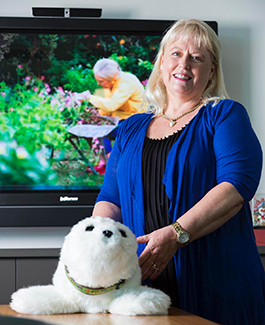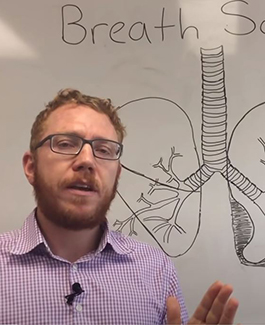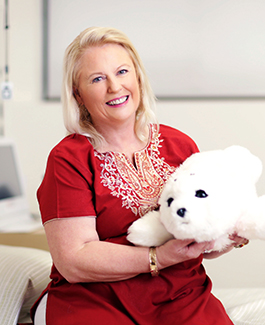Investigating links between mind-body functions
Dementia is one of the most significant health challenges of our time and is the second leading cause of death in Australia. Overall, up to 1 billion people across the globe experience brain and neurological disorders.
We work to improve the understanding and management of conditions that affect brain function and behaviour such as normal development and ageing, dementia, delirium, stroke, traumatic brain injury, autism, schizophrenia, and other health and mental health conditions.
Our research highlights

Robotics researcher recognised in World’s Top 50
Professor Wendy Moyle has been named as one of the World’s 50 Most Renowned Women in Robotics in Analytics Insight magazine.

Social participation after a right hemisphere stroke
Griffith researcher Dr Ronelle Hewetson talks about social participation after a right hemisphere stroke on this episode of the Speak Up podcast.

Views of human biology busting clips triple during COVID
Griffith’s star biology experts Dr Mike Todorovic and Dr Matthew Barton continue to prove popular on YouTube as their channel hits more than 100,000 subscribers.
Our aims
- Advance understanding of normal changes in brain functioning across the lifespan.
- Understand and address the neural, cognitive, behavioural and emotional changes associated with neurodevelopmental, acquired and progressive disorders.
- Lead the development of innovative assessments and interventions that improve the wellbeing and participation of older adults and people with neurological disorders.
- Evaluate the socio-economic burden of neurological disorders and the benefits of innovative approaches to care and service delivery for the health care system.
- Facilitate translation of evidence into practice to improve the quality, accessibility and sustainability of health care in Australia and globally.
Focus areas

Social robots: Improving quality of life for people with dementia and their carers
Our research focuses on the development and evaluation of technologies to improve quality of life, reduce behavioural and psychological symptoms of dementia (BPSD) and assess and improve pain across care settings.
Experts: Professor Wendy Moyle, Dr Lihui Pu

Changes in brain functioning across the lifespan
Our research furthers understanding of attention, distraction, and perception. We use behavioural, psychophysical, and physiological techniques to examine how these processes function in typical individuals and how they change with healthy ageing.
Expert: Dr Lisa Jefferies

Living well with a neurological disorder
Our research in rehabilitation, access to rehabilitation, and social participation assists quality of life for people with varied neurological challenges including acquired brain injury, stroke, spinal injury, neurodegenerative diseases, and cognitive problems associated with cancer.
Experts: Dr Ronelle Hewetson, Dr Heather Green

The hospital care experience and care quality
With a focus on older people, particularly those with age-related changes and dementia, and their carers, our research focuses on exploring the hospital care experience and care quality, and exploring ways to promote person-centred care for older people with unique and/or additional care needs, particularly towards the end of life
Experts: Professor Melissa Bloomer, Dr Joanne Todd

Dissemination of treatments, teaching and science communication
Our researchers are also passionate teachers and science communicators, evaluating the best ways to reach people at a distance for interventions, teaching, and making science accessible. Implementation of research into practice, with particular focus on under-served populations, forms part of this research theme.
Expert: Dr Michael Todorovic, Dr Bonnie Clough, Dr Amornrat Saito

Promoting healthy ageing and preventing hospitalisation
The focus of this research is on optimising older adults’ quality of life, including physical and cognitive health and wellbeing, through effective health service delivery in the areas of chronic disease self-management, dementia care, the prevention and management of urinary tract infection (UTI), reducing stigma, and preventing hospitalisation.
Experts: Dr Winnie Wu, Dr Katarzyna Lion
Australian Aged Care Technologies Collaborative (AACTC)
We bring together an interdisciplinary group of academics, industry partners and end-users to create the first Australian collaborative dedicated to technologies within aged care services in acute care, residential care and community areas.
The AACTC aims to increase efficiency, effectiveness and quality of care for older adults in ageing services through technologies.
Partner with us
Partnerships and collaboration are essential to our research impact. We partner widely with industry, not-for-profit organisations and government. We also collaborate with fellow researchers and maintain strong ties with our community.
If you would like to partner with us, or tap into our research expertise, facilities or services, please get in touch.
Co-lead
Professor Melissa Bloomer
Professor Melissa Bloomer’s program of research focuses on end-of-life care across inpatient hospital settings, including recognition of the often unique and additional needs of older people, particularly those with dementia, and their carers during a hospital admission and at the end of life.
Co-lead
Dr Heather Green
Dr Heather Green is a clinical psychologist, health psychologist and academic. Her research focuses on understanding and managing cognitive impairments associated with cancer and cancer treatments, optimising self-management of chronic health conditions and facilitating skill development through evidence-based teaching, training and supervision.
Members
Contact details
- Phone
- (07) 5678 8811
- Location and postal address
- Menzies Health Institute Queensland
- G40 Griffith Health Centre, Level 8.86
- Gold Coast campus
- Griffith University QLD 4222